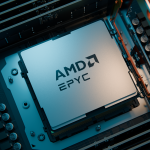
- Artificial Intelligence
- Earnings Season
- Semiconductors
Dell AI Server Revenue Surges 69% to $12.9B Despite Skepticism
6 minute read

Dell’s AI server revenue surges 69% to $12.9 billion as enterprise customers drive record infrastructure demand
Key Takeaways
- Dell shares drop 5% despite strong Q2 results after the company’s third-quarter earnings guidance of $2.45 per share fell short of Wall Street’s expected $2.55, overshadowing revenue that beat estimates at $29.78 billion.
- AI server revenue surges 69% to $12.9 billion as Dell targets doubling AI server output to reach $20 billion by fiscal 2026, driven by partnerships with Nvidia and customers like CoreWeave.
- Chinese chipmaker Cambricon posts record $144 million profit with revenue jumping 44 times to 2.9 billion yuan in H1 2025, reflecting Beijing’s push for domestic AI chip alternatives amid US export restrictions.
Introduction
Dell Technologies faces a market paradox as investors punish the company despite delivering strong quarterly results that exceeded Wall Street expectations. The technology giant’s shares fell more than 5% in extended trading Thursday following second fiscal quarter earnings that showcased robust AI server growth but disappointed with cautious forward guidance.
The company reported adjusted earnings per share of $2.32, surpassing the estimated $2.30, while revenue reached $29.78 billion against forecasted $29.17 billion. However, Dell’s third-quarter earnings projection of $2.45 per share missed analyst expectations of $2.55, creating investor uncertainty about the sustainability of its AI-driven growth momentum.
Key Developments
Dell’s Infrastructure Solutions Group emerges as the primary growth driver, with servers and networking revenue soaring 69% to $12.9 billion. The company attributes this surge to unprecedented demand for AI servers, reporting $10 billion in AI server shipments over the past two quarters and maintaining a backlog of $3.8 billion.
The systems integrator raised its full-year revenue outlook to $107 billion at the midpoint while increasing diluted earnings per share guidance to $9.55. Dell’s strategic partnership with Nvidia continues to strengthen its position in the AI infrastructure market, as the company leverages Nvidia chips to build specialized computers for enterprise customers.
Market Impact
Despite strong topline performance, Dell’s stock decline reflects broader investor concerns about margin compression in the competitive AI hardware market. The Infrastructure Solutions Group’s margins contracted to 11.9% from 12.6% in the previous quarter, signaling pricing pressures as competition intensifies.
The market reaction underscores skepticism about Dell’s ability to convert AI server demand into sustainable earnings growth. Investors appear particularly concerned about the company’s cautious earnings outlook amid an otherwise robust revenue environment.
Dell invested $1.3 billion in share repurchases and dividends during the quarter, demonstrating confidence in its long-term prospects despite near-term margin pressures.
Strategic Insights
Dell’s performance highlights the technology sector’s broader transformation toward AI and enterprise infrastructure solutions. The company’s strategic pivot from consumer hardware to higher-margin enterprise solutions positions it favorably within the projected $5.75 trillion global IT spending market expected in 2025.
However, the results also expose vulnerabilities in the AI hardware supply chain. As CNBC reports, Dell’s guidance challenges reflect industry-wide concerns about maintaining profitability while scaling AI infrastructure rapidly.
The competitive landscape intensifies as companies navigate between rapid growth opportunities and margin preservation. Dell’s ability to differentiate its offerings beyond commodity hardware becomes crucial for long-term success in the AI infrastructure market.
Expert Opinions and Data
Industry analysts remain cautiously optimistic about Dell’s medium-term prospects despite the guidance disappointment. The company’s AI server backlog provides visibility into future quarters, though conversion rates and profitability remain key variables.
Geopolitical factors increasingly influence the AI hardware market, as demonstrated by Chinese chipmaker Cambricon Technologies’ record performance. The partially state-owned company posted net profit of 1.03 billion yuan ($144 million) versus a year-earlier loss of 533 million yuan, with revenue surging nearly 44 times to 2.9 billion yuan.
Ma Cheng, chairman of Shenzhen Juze Investment Management Co., emphasizes that government support for domestic firms becomes essential to drive growth and replace imported chips amid US restrictions. This dynamic creates both opportunities and challenges for global players like Dell operating across fragmented markets.
Worldwide IT spending is projected to grow 9.3% year-over-year, with AI spending expected to maintain a 29% compound annual growth rate through 2028, supporting Dell’s strategic focus on infrastructure solutions.
Conclusion
Dell’s strong quarterly results demonstrate the company’s successful positioning within the AI infrastructure boom, yet cautious guidance reflects industry-wide challenges of balancing rapid growth with sustainable profitability. The technology sector continues to navigate intense competition, margin pressures, and evolving customer demands as AI adoption accelerates across enterprise markets.
The market’s negative reaction signals that investors expect more than just revenue growth in the current environment. Companies must demonstrate their ability to convert AI opportunity into consistent earnings while managing the complexities of a rapidly evolving and increasingly fragmented global technology landscape.








